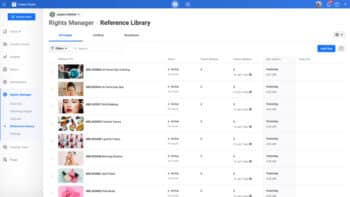Facebook Introduces Rights Manager for Images
A reason for some to cheer...

Earlier today, Facebook announced that it is expanding its Rights Manager tool, which was previously only available for audio and video, to include images.
It is a relatively small move that may have major impacts, especially on its sister site Instagram, which has become the catalyst for a slew of lawsuits as photographers and artists object to the use of their work on there.
To take advantage of this, one must apply to gain access to the Rights Manager tool. Once accepted (and if accepted) users can then upload their images and set permissions for their use including blocking them from being uploaded, allowing them in only certain countries or making case-by-case decisions.
This limitation, however, means that the tool is not for everyone. In a comment sent to The Verge, Facebook declined to say who the current users are but said that they were limited it to “trusted partners” due to the fact the tool is “pretty sensitive” and “pretty powerful”.
For those that are able to use it, they upload a CSV file to Facebook’s Rights Manager. This contains all of the information about the photo as well as the image’s metadata. Once a matching image is detected, Rights Manager will take the action outlined by the user. As for cases where a single image has multiple claimants, after a back and forth between the parties, Facebook will ultimately favor the one who uploaded it first.
While this is definitely a big step, it’s likely only going to benefit a small subset of photographers. Specifically, it will only help those that are large enough for Facebook to allow access to the Rights Manager.
Smaller creators will be stuck with the existing takedown processes, which is far slower, much less effective and, in many cases, actually made less effective through Facebook’s own actions.
Why This is Happening Now

Facebook introduced the Rights Manager tool back in 2016. The reason is that Facebook was facing a firestorm of controversy over how its new video platform was encouraging piracy.
The issue was “freebooting”, which is where users would upload videos to their Facebook page and gain more views than externally-hosted videos. This was because Facebook showed, and continues to show, a strong preference for video hosted directly on it than on third parties.
As the backlash grew, takedown notices also began to rise and, eventually, Facebook launched Rights Manager. This was a bid to both reduce their own load in handling takedown notices, but to reduce the threat of litigation, both against them and their users.
However, not all types of content were included in Rights Manager, the notable exception was images. However, controversy over the use of images has begun to grow as well as photographers have taken countless celebrities and other prominent Instagram users to court over the use of their images. This has also sparked a legal battle over embedding, even though that deals mostly with legally-uploaded images.
Facebook is clearly feeling very similar pressure to what it felt five years ago at the height of the freebooting controversy and is taking similar steps. Unfortunately, as with the freebooting issue, much of the copying isn’t from major publishers or large distributors, it’s of smaller creators.
To those groups, Facebook has a long history of being uncooperative and even obstructive when trying to get works removed. This creates a two-tier system, one that’s even more pronounced than the one at Google and YouTube, where certain creators can get their works instantly remove while others have to jump through hoops and wait days or even weeks.
While this move is certainly good and may help Facebook, and in particular Instagram, ditch the label of “lawsuit magnet”, there’s limited reason for most photographers to cheer.
Bottom Line
To be clear, this is good news. This is a good thing that Facebook is doing and it should be acknowledged as such. However, if you’re a smaller photographer or otherwise not part of the select group that has access to it, there’s not much reason to cheer.
Facebook still has serious issues when it comes to responding to takedown notices and, if you’re not in the group that has access to this tool, then nothing really has changed.
For now, the best hope for this is that it might reduce some of the legal chaos that has surrounded Facebook and Instagram lately by giving rightsholders who might otherwise turn to litigation a way to short circuit any infringement.
If it works, we might see fewer headlines about Instagram celebrities being sued (though we’ll likely hear more about posts being removed). If that does happen, it will ultimately be a win for both photographers and the users who, though upset about the removal, may have faced much more dire consequences if it hadn’t been.
Want to Reuse or Republish this Content?
If you want to feature this article in your site, classroom or elsewhere, just let us know! We usually grant permission within 24 hours.
